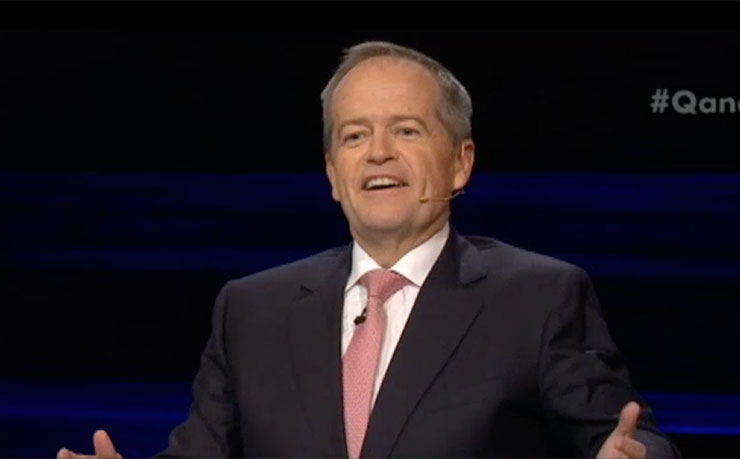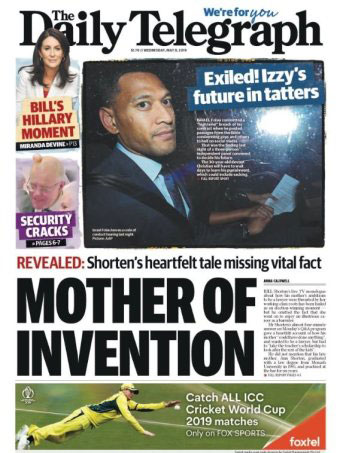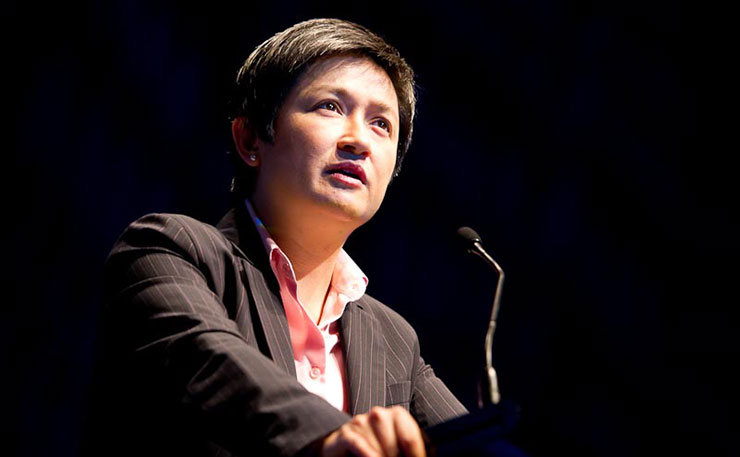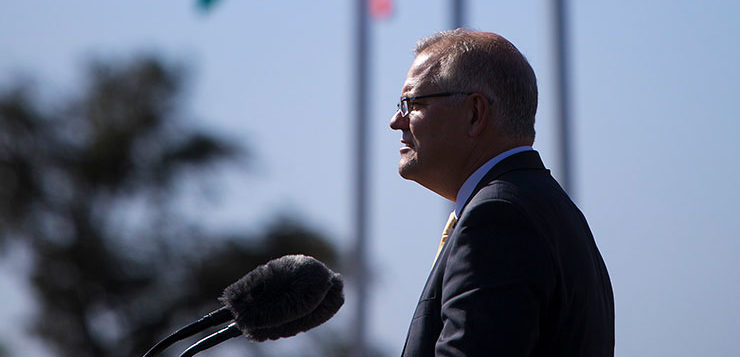DON’T MISS ANYTHING! ONE CLICK TO GET NEW MATILDA DELIVERED DIRECT TO YOUR INBOX, FREE!
The election campaign has entered its decisive phase, writes Ben Eltham.
After a long phoney war in which both major parties struggled to gain momentum, we saw a decisive break in the campaign this week. Labor’s campaign has gathered strength. In contrast, the wheels are falling off for the Coalition.
Neither trend was inevitable. Mid-way through the campaign, it looked as though the government had at least the preconditions available for a come-from-behind victory. Labor’s policies around franking credit rebates and negative gearing reform have generated much stronger opposition than expected, even accounting for the notorious loss aversion of Australian taxpayers (or in this case, tax receivers). Despite his obvious limitations as a leader, Scott Morrison has demonstrated plenty of energy on the trail.
Labor has also faced challenges. The party has put forward a raft of progressive policies, but the sheer number of them, and the scale of the reform agenda it is proposing, has meant that it has been hard for many voters to get their head around them. Bill Shorten is far from an unknown quality, but nor is he a charismatic leader in the mould of Whitlam, Hawke, or 2007 Kevin Rudd. While the ALP is doing well in Victoria, Labor has found the going tougher in Queensland and parts of New South Wales.
Week three of the campaign was largely a washout, dominated by a succession of micro-scandals as poorly-vetted candidates were forced to withdraw over dubious comments from their past on social media. These had local importance: in the seat of Melbourne, for instance, they forced the withdrawal of Labor’s Luke Creasy, just when the ALP thought the Greens’ only lower house seat was back in play.
In Tasmania, Jessica Whelan was disendorsed after racist comments surfaced, destroying the Coalition’s hopes of winning Lyons. But at a general level, the scandals only served to distract the media and much of the political class from bigger debates about policy. That could have hurt Labor, who after all is winning the policy debate. But as it turned out, the result was simply a draw.
That set the scene for the more decisive inflexion points of this penultimate week of the campaign. Rather improbably, the surprise package has been Bill Shorten himself, who has emerged from his trial by fire as the outstanding performer of the campaign.
Shorten has comfortably won the three debates of the campaign, for instance. None of them were knockout blows, but there is a sense in which Shorten has come out slightly ahead of the prime minister in all of them. Shorten showed himself calmer, better prepared and more agile than Morrison, who consistently struggles whenever he can’t ride over the top of his opponents with pure aggression. 3-0 is a decisive result. Does it matter? It depends if you think anyone changes their vote after watching leaders’ debates. Some do, but surely not many.

On Monday night, Shorten appeared solo for a special town-hall style episode of the ABC’s Q & A. Shorten was assured and empathetic, particularly when talking about his upbringing and his much-loved mother. The opposition leader has been travelling the country for months now, conducting more than 80 of these community events, where he has patiently answered questions from all comers, and it shows. At times there were glimpses of a larger Shorten, a man for whom politics is more than just a factional contest.
And it was this larger, more three-dimensional Bill Shorten that gave us the key moment of the campaign so far. In a twist of pure irony, the turning point came on Wednesday, after three News Corp tabloids ran an ill-advised attack article against Shorten’s mother. Yes, his mother.
It’s a measure of the debased nature of the Australian media that those of us who follow the News Corp machine were not surprised at a hatchet job of this ilk. For at least a decade now, the News Corp newspapers have eschewed any pretence of impartiality. They have openly campaigned for the Liberal and National Parties, and against the Labor Party, often in the most vicious, personal and defamatory tones.
Attacking the mother of a politician, five years dead, was probably never going to impress many. But it also betrays a larger miscalculation of the News Corp culture warriors. The power of the News Corp media machine is waning. It may always have loomed larger in the imaginations of politicians than of voters, but in recent years the general decay of trust in political institutions – egged on, of course, by the populist media itself – has eroded the effectiveness of News Corp smear tactics.
None of this would have mattered if Shorten had buckled under the strain. But he didn’t. Instead he showed voters some genuine emotion. Defending the memory of his mother, Shorten quietly destroyed the facile imputations of hypocrisy pedalled by the Daily Telegraph’s Anna Caldwell – which were, basically, that Shorten had grown up rich, and had no right to paint himself as working class.

On any level, this was nasty, gutter journalism. It was also untrue – it turns out Ann Shorten, despite the mighty achievement of qualifying for the bar as a working mother, received very few briefs as a barrister, and had to go back to a day job. But the attack was also spectacularly misjudged, as it gave Shorten the opportunity to present himself as a human being. Labor’s front bench, goaded by decades of smears from News Corp, went on the attack. Social media went on a jag of love for motherhood.
Like Tony Abbott and Malcolm Turnbull, the Daily Telegraph is the latest in a long line to have committed the fatal error of underestimating Bill Shorten.
As the penultimate week drew to a close, the bookmaker’s odds started to blow out against the Coalition. All the available polling shows that Labor retains its election-winning lead. The race isn’t tightening. The Coalition isn’t gaining. The gap isn’t closing.
Morrison has been tireless, barnstorming the country with a never-ending series of photo opportunities and media stunts. But the inherent weaknesses of the Coalition’s campaign are starting to assert themselves.
As we argued at the start of the campaign, the Coalition launched its tilt at re-election well behind. The Liberal Party had removed its most popular leader, with only a cursory explanation to voters. It is divided internally: riven by ideological dissent and by personal hatreds between moderates and conservatives. The Coalition has so little policy that even seasoned observers struggle to explain what it is the Liberal Party stands for, beyond lower taxes and keeping Labor out of office. As a result, there is basically no election platform from which to woo voters. Morrison is stumping the country selling little more than the tax cuts and a series of marginal seat micro-bribes for level crossings and road widenings.
Much of the Coalition’s best talent has quit politics; the remainder of the front bench is performing so poorly that senior ministers like Melissa Price, Mitch Fifield and Dan Tehan are being kept in witness protection. This week the Coalition sent Simon Birmingham to debate Penny Wong on foreign affairs. Where was foreign minister Marise Payne? If your cabinet minister can’t turn up to a debate on her own portfolio, it’s not a great sign of your party’s fitness for government.

The Coalition does have one thing going for it – the genuine sense of fear that has been whipped up amongst retirees about Labor’s negative gearing and franking rebate policies. There is no doubt that many retirees are deeply concerned about Labor’s plans, even if very few of them will actually be affected.
But even here, the scare campaign is inflicting costs. There was a telling moment at a town hall appearance by Scott Morrison in Port Macquarie on Thursday, in which a retired voter complained that she couldn’t get her 40-something children to vote Liberal, or to understand why Labor’s policy on franking credits are a bad idea.
“One of my children has trouble with – I understand it – but I have trouble with explaining why … the franking credits is not a gift and their father has tried to explain if you don’t earn enough tax to have to pay tax, that’s why you get it back. But it is very difficult for them to get it through to the 40-year-olds why it is not a gift.”
No doubt it is difficult to “get it through to the 40-year-olds” why the government is paying cash rebates to people who pay no tax, simply because they own fully franked shares. The difficulty of defending the absurdly generous tax concessions showered largely on wealthy, older Australians by the current tax system shows the stark generational divide that this election has opened up, and not just on tax policy.
Labor stands for middle Australia, for working parents, for renters locked out of the housing market, for cancer patients, for anyone who believes something should be done about climate change. In contrast, the Coalition has narrowed its message to a defence of the privileges of the wealthy and the old.
It’s a message that is cutting though in some demographics. It might swing some crucial votes in marginal seats. But it’s not a platform likely to build a majority across the electorate.
The clock is running down for the Coalition. It’s very hard to see how the government can win from here.
DON’T MISS ANYTHING! ONE CLICK TO GET NEW MATILDA DELIVERED DIRECT TO YOUR INBOX, FREE!
Donate To New Matilda
New Matilda is a small, independent media outlet. We survive through reader contributions, and never losing a lawsuit. If you got something from this article, giving something back helps us to continue speaking truth to power. Every little bit counts.




